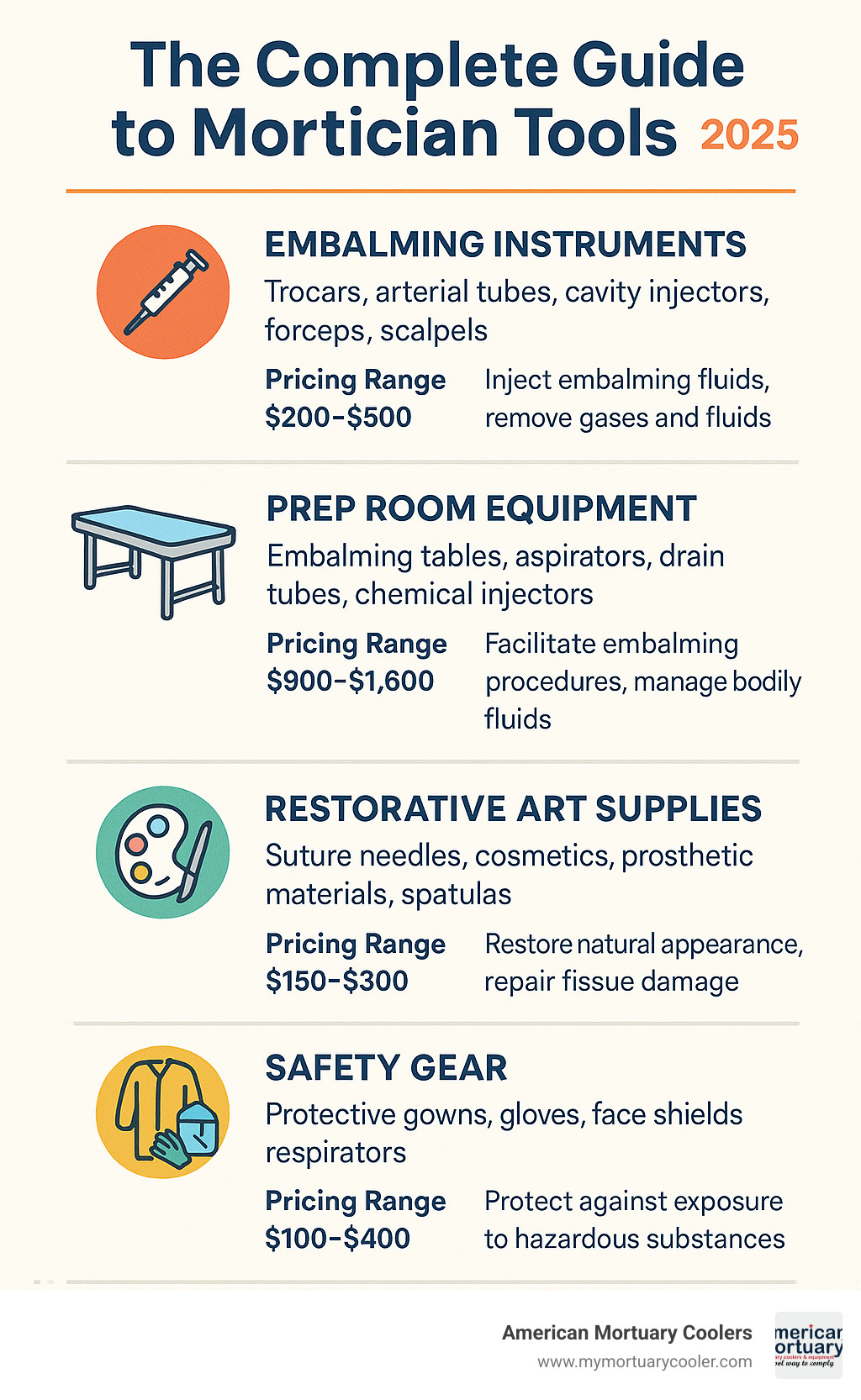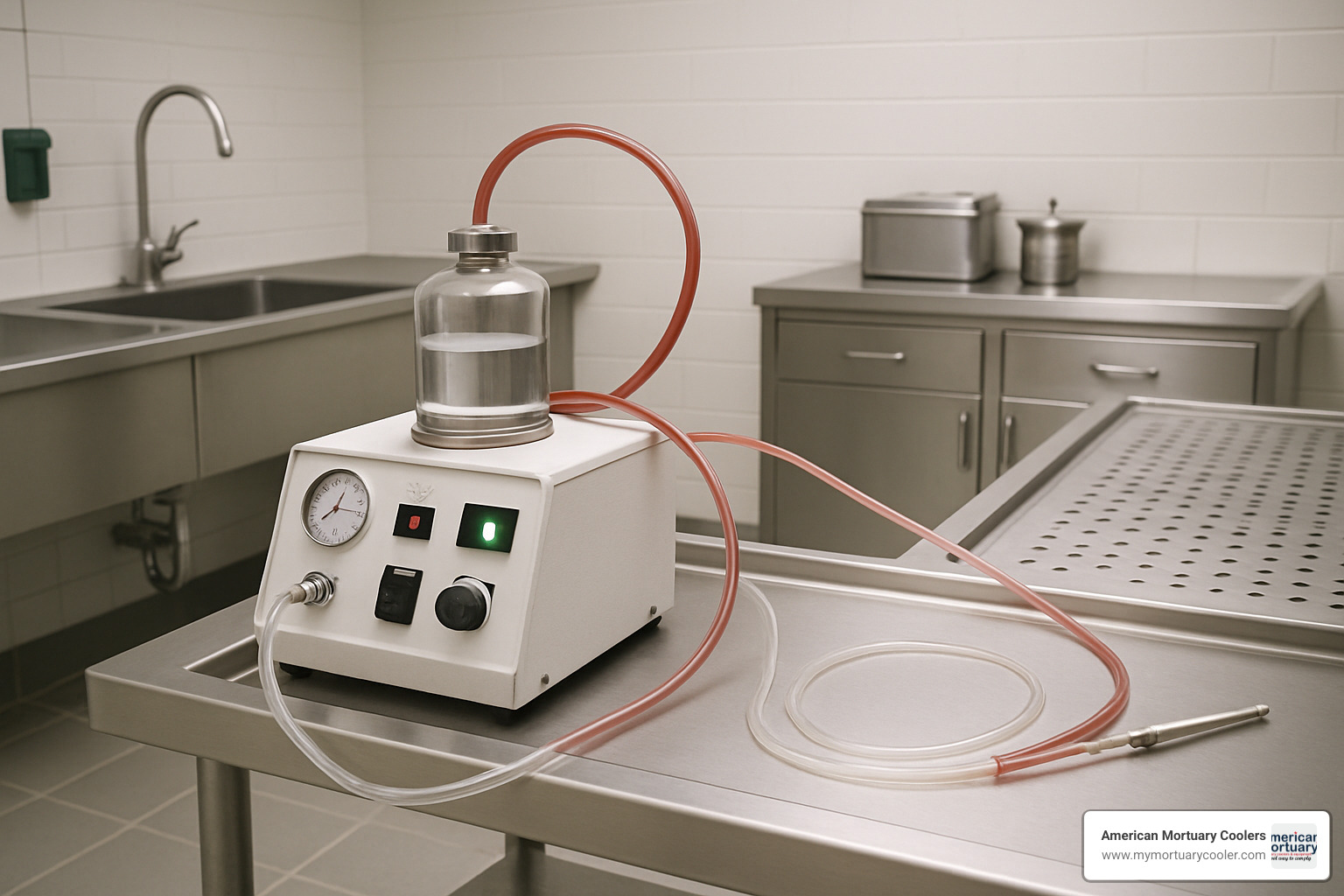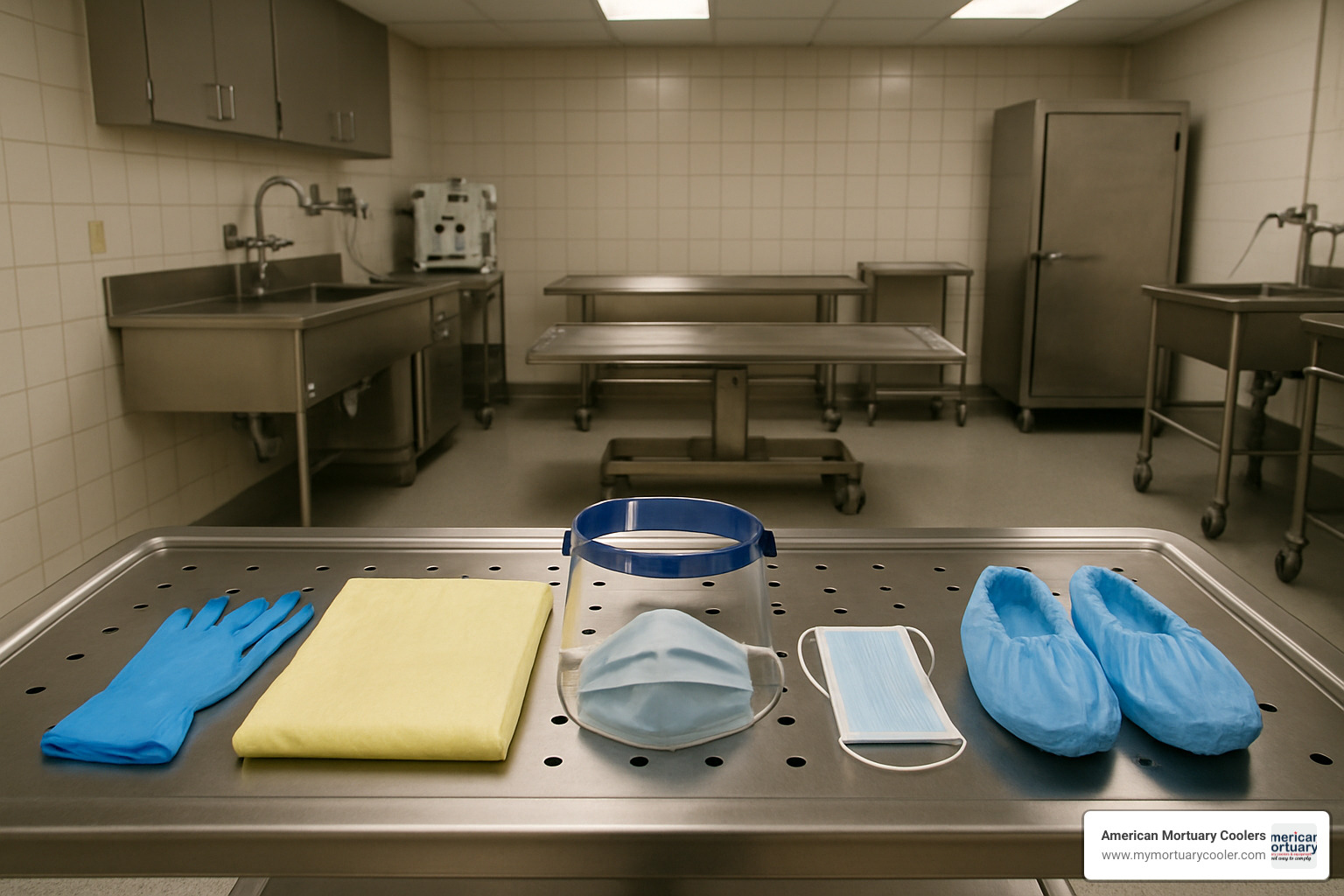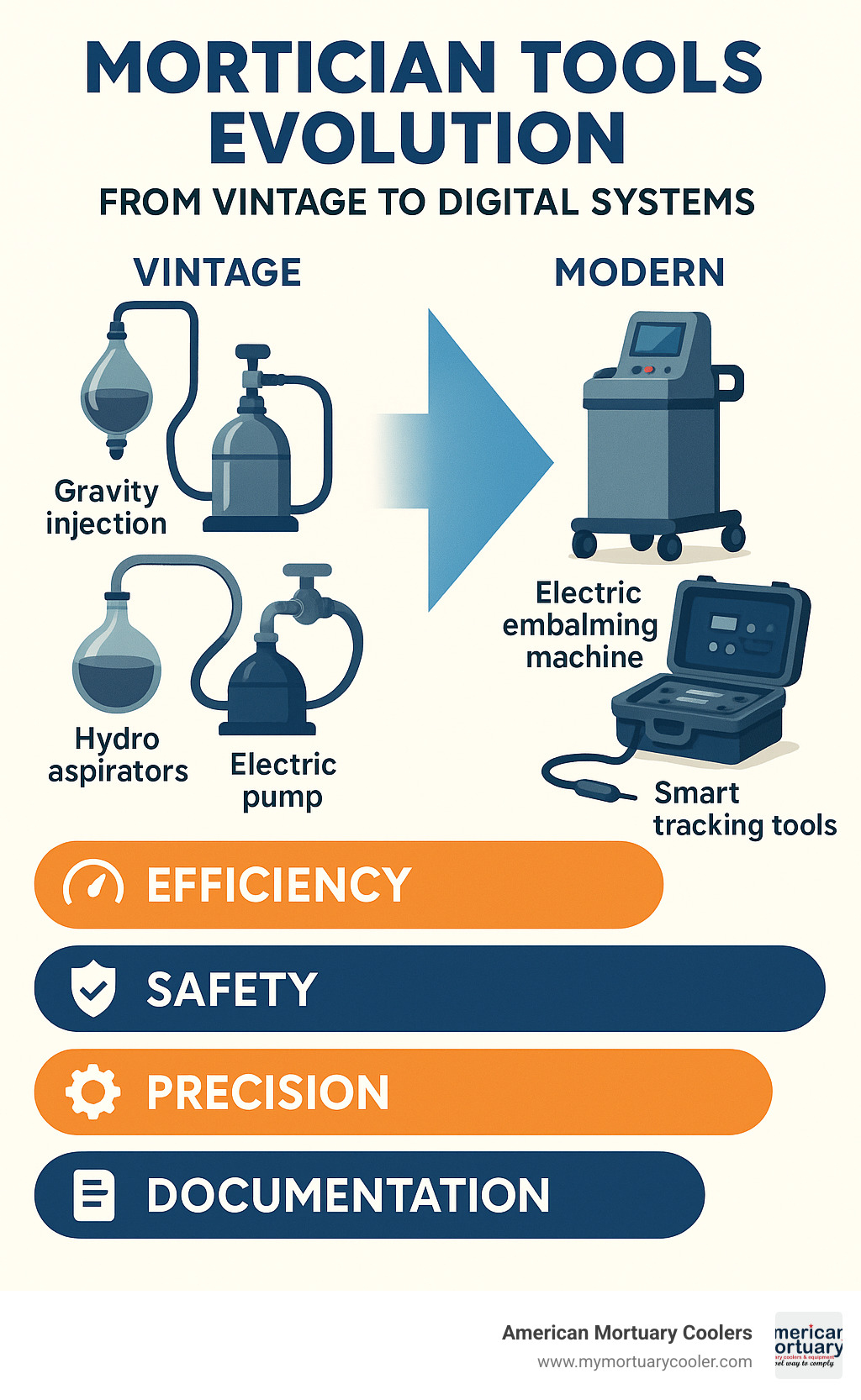Why Professional Mortician Tools Are Essential for Quality Funeral Services
Mortician-tools- are the specialized instruments and equipment that funeral professionals rely on to prepare, preserve, and present the deceased with dignity and respect. These essential tools range from embalming instruments like trocars and arterial tubes to restorative art supplies and protective equipment.
Essential mortician tools include:
- Embalming instruments - Trocars, arterial tubes, cavity injectors, forceps, scalpels
- Prep room equipment - Embalming tables, aspirators, drain tubes, chemical injectors
- Restorative art tools - Suture needles, cosmetics, prosthetic materials, spatulas
- Safety equipment - Protective gowns, gloves, face shields, respirators
- Transport gear - Mortuary stretchers, body lifts, transfer boards
- Digital tools - Case management software, tracking systems, documentation apps
The mortuary industry has evolved significantly from basic hand tools to sophisticated equipment. Modern embalming machines like the Portiboy have replaced gravity-fed systems, while digital solutions like MorTrack software help funeral homes increase efficiency by up to 30%.
As one funeral director noted: "The mortuary stretcher is great! We already used it for (transporting) 450 pounds… smooth and easy to operate." This highlights how proper tools directly impact daily operations and service quality.
Quality instruments are crucial for maintaining professional standards. A basic embalming instrument kit ranges from $52 to $540, while individual tools like Super Drain Tubes cost around $43 each. The investment in proper equipment ensures consistent results and regulatory compliance.
I'm Mortuary Cooler, a national-level mortuary cooler supplier with experience in providing funeral professionals with reliable mortician-tools- and refrigeration solutions. My background in mortuary equipment helps funeral homes select the right tools for their specific operational needs and space requirements.

Similar topics to mortician-tools-:
- embalming stations-
- autopsy-table-
- body-bag-
Essential Categories of Mortician-Tools-
When you're building a complete toolkit for your funeral home, understanding the different categories of mortician-tools- makes all the difference. Each category serves a specific purpose in caring for families during their most difficult times, and having the right equipment ensures you can provide dignified, professional service every single day.
Mortician-Tools- for Embalming Procedures
The heart of any mortuary operation lies in its embalming instruments. These precision tools require careful selection because they directly impact the quality of your work and the peace of mind you provide to grieving families.
Arterial tubes are your first consideration when setting up vascular access. You'll find these essential tools come in multiple configurations - slip hubs are available in 3/16", 1/8", and 3/32" sizes to match different vessel diameters precisely. Whether you choose threaded artery tubes or taper fit varieties, the key is ensuring secure connections during fluid injection.
Trocars handle the critical work of cavity aspiration and chemical injection. Solid stainless steel trocars offer the durability you need for daily use, while trocar button applicators ensure proper seal placement every time. Don't forget the trocar cleaning rod and brushes - keeping these instruments spotless between uses is essential for maintaining professional standards.
Your forceps and clamps provide the tissue manipulation capabilities that make precise work possible. Spencer Wells forceps excel at vessel clamping, while mosquito forceps handle fine detail work beautifully. Dissecting forceps help with tissue handling, and gathering forceps assist with positioning. These tools come in both economy and guaranteed quality grades, so you can choose based on your budget and volume needs.
Scalpels need to deliver precise incisions consistently. Disposable scalpel handles like the #3 model (currently $6.15, down from $7.00) paired with replacement blade packs ($4.60 for 4 blades) offer an economical cutting solution that maintains sharpness.
Cavity injectors work hand-in-hand with your trocar systems to deliver chemicals directly where needed. This ensures thorough preservation throughout the entire process.
Super Drain Tubes represent a significant investment at $42.95 each, but they facilitate the efficient fluid removal that's crucial for quality results.
Mortician-Tools- for Restorative Art & Cosmetics
The world of mortuary cosmetics has transformed dramatically in recent years. Hollywood FX makeup techniques now influence how we approach restoration work, with Emmy award-winning artists even teaching specialized courses to funeral professionals.
Prosthetic alternatives have completely replaced traditional wax-based products in many funeral homes. These new formulations eliminate the smearing issues that used to frustrate embalmers while providing superior coverage and remarkably natural appearance.
Non-smear cosmetics represent one of the biggest advances in mortuary makeup. Modern color pallets are designed to work with every skin tone, ensuring you can provide appropriate matching for the diverse families you serve.
Suturing needles come in specialized configurations specifically for mortuary work. Half-curved needles in 4.5"-5.5" lengths typically cost around $0.69-$2.59 each, while double-curved varieties offer different stitching angles for various applications. You can purchase packs of 10 double-curved suture needles for $13.60, with half-curved packs running $15.00.
For professionals looking to expand their capabilities, exploring cutting edge tools can significantly improve restoration outcomes.
Prep Room & Handling Equipment
Your prep room equipment represents some of the largest investments you'll make, but these tools form the foundation that supports safe, efficient operations every day.
Embalming tables serve as the centerpiece of your prep room. Multi-height folding embalming tables offer excellent versatility for different cases, while hydraulic models provide impressive 1,000-pound weight capacity. One satisfied customer recently told us: "The quality with the hydraulic embalming table is above and beyond what I expected!"
Body lifts eliminate the manual handling risks that can lead to workplace injuries. Battery-powered scissor lifts, stainless steel crematory lifts, and manual hydraulic mortuary lifts each serve different operational needs and budgets. The key is matching the equipment to your facility's specific requirements.
Mortuary stretchers ensure safe transport throughout your facility. Multi-level bariatric stretchers handle 1,000+ pound capacity for larger individuals, while standard models manage 500-pound loads effectively. Look for features like securement straps and cot pouches that improve safety during transport.
Refrigeration systems preserve remains during extended preparation periods, which is especially important when families need time to make arrangements. Here at American Mortuary Coolers, we specialize in crafting custom mortuary coolers designed for your specific facility requirements, with direct delivery across the contiguous 48 states.

Inside the Embalming & Body Preparation Process
The art of embalming requires both technical skill and the right mortician-tools- to honor the deceased with dignity. Every funeral professional follows time-tested protocols that transform clinical procedures into respectful preservation practices.
The process begins with vascular embalming, where arterial access becomes the foundation of everything that follows. Using precise scalpel incisions and careful forceps manipulation, embalmers create pathways for preservation fluids. Modern embalming machines like the Portiboy have revolutionized this step, replacing the old gravity-fed systems with precise pressure control that ensures consistent results every time.
Cavity aspiration follows next, requiring steady hands and proper trocar technique. The 10-foot aspirator/trocar tubing provides the reach needed for thorough work, while anti-clogging aspirator heads prevent those frustrating blockages that can disrupt the workflow. This step removes fluids systematically, preparing the body for the preservation chemicals that follow.
Feature setting demands the most delicate touch. This is where specialized forceps and positioning tools help create a natural, peaceful appearance. It's not just about technique - it's about seeing the person as someone's loved one and treating them accordingly.
The final cosmetic finishing stage brings together all the advances in restorative art. Non-smear products and precision applicators help achieve that natural presentation families expect. This step maintains dignity while ensuring the deceased looks like themselves, not like they're wearing a mask.
Step-by-Step Use of Key Instruments
Understanding how each tool works in sequence makes the difference between good work and exceptional care. The scalpel incision starts everything - sharp blades and steady pressure minimize tissue damage while creating clean access points. There's no room for hesitation here.
Arterial tube insertion establishes those crucial fluid delivery pathways. Curved arterial tube slip hubs work with the body's natural anatomy, not against it. The key is maintaining secure connections while respecting the vessel structure. A loose connection means starting over, while too much force damages delicate tissues.
Trocar aspiration requires systematic technique to prevent cross-contamination. Proper trocar work ensures thorough drainage without creating unnecessary trauma. Each movement should be deliberate, following established patterns that experienced embalmers know by heart.
Suturing closes the process with minimal visible scarring. Different needle curvatures accommodate various anatomical locations - what works on an arm won't necessarily work on the neck. The goal is invisible repairs that honor the person's appearance.
For professionals wanting to master these techniques, detailed guides on scalpel knife applications provide comprehensive instruction on proper blade handling and cutting methods.
Functions & Best Practices for Specific Tools
Getting the details right separates amateur work from professional excellence. Arterial tube sizing must match vessel diameter exactly - undersized tubes create frustrating leakage, while oversized tubes damage vessel walls unnecessarily. It's like finding the right key for a lock.
Trocar button applicators need perfect positioning to prevent leakage later. The button must seal completely against surrounding tissue, creating an invisible barrier that maintains the body's integrity throughout the viewing period.
Cavity chemical injectors deliver preservatives evenly throughout body cavities using systematic injection patterns. Random application leaves gaps that compromise preservation quality. Professional embalmers develop injection sequences that ensure complete coverage every time.
Forceps handling requires a gentle but confident touch. Spencer Wells forceps excel at clamping larger vessels, while mosquito forceps handle delicate detail work. The right tool for each task prevents tissue damage and maintains professional results.
Research from funeral suppliers continues expanding our understanding of safety protocols and best practices, helping professionals stay current with evolving industry standards.
Safety, Sterilization & Maintenance Protocols
Mortuary work involves significant health hazards requiring comprehensive safety protocols. Proper protective equipment and sterilization procedures protect staff while maintaining professional standards.
PPE standards mandate complete coverage during embalming procedures. The funeral industry recognizes that exposure to chemicals and biological materials requires robust protection.
Chemical hazards include formaldehyde exposure and other preservative compounds. Proper ventilation and respiratory protection minimize health risks.
Autoclave methods sterilize reusable instruments between cases. High-temperature steam sterilization eliminates pathogens effectively.
Instrument sharpening maintains cutting tool effectiveness. Dull instruments require excessive force, increasing accident risk.
Regulatory oversight ensures compliance with occupational safety standards. Regular inspections verify proper safety protocol implementation.

Protective Equipment Checklist
Gloves provide barrier protection against chemicals and biological materials. Nitrile exam gloves offer superior chemical resistance compared to latex alternatives.
Face shields protect against splash exposure during aspiration and injection procedures. Full-face coverage prevents chemical contact with eyes and mucous membranes.
Gowns create body barriers against contamination. Isolation gowns with liquid-resistant properties prevent chemical penetration.
Respirators filter airborne contaminants including formaldehyde vapors. Proper fit testing ensures adequate protection.
Eye protection prevents chemical splash injuries. Safety glasses with side shields provide comprehensive coverage.
For complete equipment specifications, professionals can review essential embalming equipment guidelines.
Cleaning & Storage of Reusable Mortician-Tools-
Stainless steel care requires specific cleaning protocols to prevent corrosion. Enzymatic cleaners remove protein deposits without damaging instrument surfaces.
Enzymatic cleaners break down biological materials that standard detergents cannot remove. These specialized solutions prepare instruments for sterilization.
Dry storage trays prevent moisture accumulation that leads to corrosion. Proper storage extends instrument life significantly.
Log books document sterilization cycles and maintenance schedules. Regulatory compliance requires detailed record-keeping of all safety procedures.
Evolution: Vintage vs Modern Toolkits & Digital Innovations
The change of mortician-tools- over the past century tells a fascinating story of innovation driven by both necessity and compassion. What started as crude bronze instruments has evolved into sophisticated equipment that honors the dignity of the deceased while protecting the health of funeral professionals.
History of embalming reveals humble beginnings with gravity-fed systems that required funeral directors to manually pump fluids and rely on basic hand tools. Those early bronze trocars were functional but lacked the precision we expect today. Manual pumps demanded significant physical strength, and maintaining consistent pressure was nearly impossible.
Stainless steel kits revolutionized the industry by offering instruments that could withstand repeated sterilization while maintaining sharp edges. These modern tools provide guaranteed quality that vintage equipment simply couldn't match. Where a bronze trocar might last a few years, today's stainless steel instruments can serve thousands of procedures with proper maintenance.
The digital chain of custody represents perhaps the most dramatic shift in mortuary operations. MorTrack software exemplifies this evolution, helping funeral homes increase their efficiency by 30% in the first year alone. In April 2024, MorTrack clients processed 9,831 digital documents, saving an estimated $9,831 in service fees by eliminating paperwork delays and errors.
| Feature | Vintage Tools | Modern Tools |
|---|---|---|
| Materials | Bronze, basic steel | Stainless steel, specialized alloys |
| Precision | Manual control | Electronic regulation |
| Safety | Basic protection | Comprehensive PPE systems |
| Efficiency | Labor-intensive | Automated processes |
| Documentation | Paper records | Digital tracking |
| Cost | Lower initial investment | Higher upfront, lower operational costs |
This comparison shows how far the industry has come. While vintage tools required significant manual labor and offered limited safety features, modern equipment prioritizes both efficiency and worker protection.
From Hand-Pumps to Portiboy Machines
The evolution from hand pumps to modern embalming machines illustrates how technology has transformed daily operations in funeral homes. Early gravity injection systems required funeral directors to physically lift fluid reservoirs and manually control pressure - a process that was both exhausting and imprecise.
Hydro aspirators marked the first major improvement, using water pressure to create vacuum suction. These systems eliminated much of the manual labor while providing more reliable fluid removal than hand-operated pumps.
The introduction of electric pumps changed everything. Portiboy machines now deliver precise pressure control with the turn of a dial, ensuring consistent results regardless of the operator's experience level. The portability of modern equipment means funeral homes can position machines exactly where needed, rather than designing prep rooms around fixed installations.
Precision has become the hallmark of contemporary embalming equipment. Electronic controls eliminate the guesswork that plagued earlier generations of funeral professionals, leading to better preservation results and more predictable outcomes.
Software & Smart Tracking Tools
The digital revolution has reached every corner of the funeral industry, changing how professionals manage their daily operations. Case management software has replaced filing cabinets full of paperwork with streamlined digital workflows that prevent the loss of critical documents.
Document digitization addresses what many consider the funeral industry's biggest challenge - managing paperwork efficiently. Lost permits, illegible handwriting, and misplaced forms have frustrated funeral directors for decades. Digital solutions provide instant access to all case information while maintaining secure backups.
The 30% case increase that many funeral homes experience after implementing digital tools isn't just about handling more volume - it's about serving families better through improved organization and reduced errors. When funeral directors spend less time searching for documents, they can focus more attention on grieving families.
Professional management systems like MorTrack demonstrate how software and smart tracking tools can revolutionize funeral home operations. These platforms handle everything from initial case intake to final billing, creating seamless workflows that reduce stress for both staff and families.
The future of mortician-tools- clearly lies in this blend of precision instruments and intelligent software. While the fundamental goals remain unchanged - treating the deceased with dignity while serving grieving families - the tools available to achieve these goals continue to evolve at an unprecedented pace.

Frequently Asked Questions about Mortician-Tools-
Starting a career in mortuary science or upgrading your funeral home's equipment brings up many practical questions. Here are the most common concerns we hear from professionals across the industry.
What are the must-have tools for a new embalmer?
Every new embalmer needs to start with the fundamentals. The good news is that you don't need everything at once - you can build your toolkit gradually as you gain experience.
Your basic embalming instrument kit forms the foundation of your practice. These kits range from $52 to $540 depending on the quality level and number of instruments included. Starting with a mid-range kit usually provides the best balance of quality and affordability.
Cutting instruments are absolutely essential. A scalpel handle #3 costs around $6.15 (down from $7.00), and you'll need replacement blade packs at $4.60 for 4 blades. Sharp, reliable cutting tools make every procedure safer and more precise.
Arterial tubes in multiple sizes are crucial for vascular access. You'll need 3/16", 1/8", and 3/32" sizes to accommodate different vessel diameters. Having the right size prevents leakage and ensures proper fluid distribution.
Trocars with cleaning equipment handle cavity aspiration and chemical injection. Don't forget the cleaning rods and brushes - maintaining these instruments properly extends their life significantly.
Forceps sets give you the precision control you need. Spencer Wells forceps work great for clamping vessels, while mosquito forceps handle detailed work. Dissecting forceps help with tissue manipulation.
Suture needles come in different curves for various applications. Half-curved needles (4.5"-5.5" length) cost around $0.69-$2.59 each, while double-curved varieties offer different stitching angles. Packs of 10 are more economical.
Personal protective equipment isn't optional - it's mandatory. Gloves, gowns, face shields, and respirators protect you from chemical and biological hazards. This equipment pays for itself by preventing health issues and regulatory violations.
Most new embalmers can expect to invest $500-$2,000 for their initial toolkit, depending on quality choices and whether they buy individual items or complete packages.
How often should instruments be sterilized?
This question comes up constantly, and the answer is simple: between every single case. No exceptions, no shortcuts.
Complete sterilization means more than just a quick rinse. Your instruments need autoclaving at proper temperature and pressure to eliminate all pathogens. Enzymatic cleaning removes biological materials that regular detergents can't handle - this step is crucial before sterilization.
Proper drying and storage in sterile containers prevents recontamination. Many funeral homes make the mistake of storing clean instruments in contaminated containers, which defeats the entire purpose.
Documentation matters too. Log books tracking sterilization cycles aren't just good practice - they're often required for regulatory compliance. If an inspector asks about your sterilization protocols, you'll need proof.
Daily maintenance includes cleaning and inspecting all equipment, even pieces you didn't use that day. Dust and environmental contaminants can compromise sterility. Weekly deep cleaning of storage areas and monthly equipment calibration keep your safety systems working properly.
Proper sterilization protects both your staff and the families you serve. It's worth the extra time and effort.
Where can professionals purchase certified equipment?
Finding reliable suppliers for mortician-tools- can feel overwhelming, especially when you're starting out. The key is working with authorized dealers who understand mortuary work and can provide proper documentation and warranties.
Specialized mortuary supply companies often offer the best selection and expertise. They understand your specific needs and can recommend appropriate equipment for your case volume and budget.
Medical equipment distributors with mortuary divisions provide another good option. They often carry high-quality instruments and have established service networks.
Direct manufacturer sales work well for major equipment purchases like embalming machines and prep room furniture. You'll often get better pricing and warranty terms buying directly.
Regional distributors serving local markets can provide faster service and personal relationships. They understand local regulations and can offer hands-on support.
Quality considerations should guide your purchasing decisions. Look for FDA approval where applicable, manufacturer warranties and service support, compliance with industry standards, and availability of replacement parts and consumables.
At American Mortuary Coolers, we work with funeral homes across Tennessee, Georgia, Illinois, South Carolina, Texas, California, New York, and Pennsylvania to provide custom equipment solutions. Our direct delivery across the contiguous 48 states means you get reliable equipment without the hassle of multiple suppliers.
The funeral industry is built on relationships and trust. Choose suppliers who understand your work and can support you long-term, not just make a quick sale.
Conclusion
The world of mortician-tools- continues evolving at a remarkable pace, blending time-honored traditions with cutting-edge technology. Today's funeral professionals work with equipment that would seem like science fiction to embalmers from just a generation ago.
Future-proof toolkits represent the perfect marriage of old-school craftsmanship and modern innovation. Those trusty stainless steel instruments still provide the durability professionals depend on, while electronic systems bring unprecedented precision to every procedure. Digital tracking systems ensure compliance while making daily operations smoother than ever before.
The numbers don't lie when it comes to service quality improvements. Research consistently shows that funeral homes embracing modern management software see their case volume increase by 30% while cutting operational costs significantly. It's not just about having fancy equipment - it's about working smarter, not harder.
But here's what really matters: dignity assurance remains at the heart of everything we do. Whether you're using a basic suture needle that costs less than a dollar or operating a sophisticated embalming machine worth thousands, every single tool serves one sacred purpose. We're here to honor the deceased and bring comfort to grieving families.
That's where American Mortuary Coolers craftsmanship comes into play. We understand that quality equipment forms the absolute foundation of exceptional funeral service. Our custom mortuary coolers and refrigeration solutions work hand-in-hand with the comprehensive toolkits that modern funeral professionals need to succeed.
From our Tennessee headquarters, we've been delivering custom equipment solutions across all 48 contiguous states. We support funeral homes with the reliable infrastructure they need to serve families with true dignity and professionalism.
The investment in proper mortician-tools- goes way beyond operational necessity. It's a statement about your commitment to the highest standards of funeral service. As our industry keeps advancing, the professionals who accept both traditional techniques and modern innovations will consistently provide the most meaningful service to the families who trust them during their most difficult moments.
For comprehensive mortuary equipment solutions, including custom cooling systems that preserve remains with the same precision as the finest embalming instruments, explore our mortuary cooler options designed specifically for professional funeral service requirements.



















